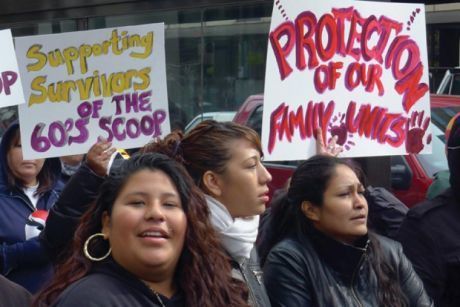News
You are here
Court victory for First Nations “60s Scoop” survivors

February 17, 2017
On February 14, 2017, after eight years of court battles, First Nations plaintiffs in Ontario won a big court victory over the federal government. Ontario Superior Court Justice Belobaba sided with the survivors of the “60s Scoop” who argued that the government sanctioned wholesale adoption into non-Indigenous families led to the trauma associated with loss of language, culture, family and community. As Belobaba said, “The uncontroverted evidence of the plaintiff’s experts is that the loss of their Aboriginal identity left the children fundamentally disoriented, with a reduced ability to lead healthy and fulfilling lives.”
Their removals, which happened between 1965 and 1984, were “justified” by child welfare agencies that judged First Nations’ ways of parenting as not up to the “standard” of white, Eurocentric society. This was combined with a refusal to alleviate the harsh conditions caused by colonially enforced poverty that made families vulnerable.
In Ontario alone, over 16,000 children were removed. The effects were devastating for the parents whose children were taken away. And those who were removed, like virtually all adoptees, ultimately wanted to come home. If they were allowed to find out where home was and if they were able to get there, they often felt they did not fit in because they had no knowledge of the community’s language or traditions.
Fighting back
But the spirit of resistance was never far away and today in every province Indigenous peoples are fighting back through lawsuits against either the federal or provincial governments responsible. In Ontario, the fight was led by Beaver House Chief Marcia Brown Martel. Adopted out at age nine, she later discovered the Canadian government had declared her original identity dead. After the judge’s decision, she told the CBC “Our voices were finally heard and listened to.”
The survivors are asking for $85,000 each in damages, for a total of $1.3 billion, arguing that the federal government breached part of the agreement that requires consultation with First Nations bands about the federally funded child welfare program.
Keep up pressure on Trudeau Liberals
The main reason the court battle went on so long was the disgusting practice of both the Harper and Trudeau governments to have the case delayed or dismissed. As recently as early February the government tried to block Belobaba from handing down his ruling, saying that Indigenous Affair Minister Carolyn Bennett wanted to “negotiate” with survivors. And on February 2, government lawyers said that “the government did not have a legal obligation to concern itself with the cultural identity of Indigenous people” according to the plaintiff’s lawyer Jeffery Wilson.
But this is the same Trudeau government that has totally refused to negotiate with First Nations child welfare agencies across Canada to provide the equitable funding declared required by the Canadian Human Rights tribunal. That tribunal case also took almost ten years due to government efforts to highjack proceedings. The tribunal will meet again in March to decide what more can be done to bring the government into compliance.
No doubt the resilience of the Sixties Scoop survivors will mean they will refuse to be seduced by the government’s so-called “offer to negotiate”. Indeed one survivor, William Campbell who now lives in Thunder Bay, told CBC “Even today there are more First Nations kids in care than ever before. Obviously, the problem is still there.”
Still, the court decision is a great victory for First Nations survivors.
Section:
Topics:









